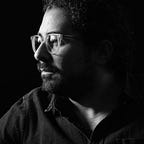The Suitcase of Cinema — Argentina
by Javier Solórzano Casarin
“The Aura” (2005)
Fabián Bielinsky
Patagonia is almost like another continent. It isn’t just a portion of land of unimaginable size, it is also charted by a grand variety of ecosystems like few places in the world. There are glaciers, deserts, forests and a formidable abundance of vegetation and wildlife to such an extent that one would be surprised to find out that it is only a part of the country of Argentina. For many scholars and novelists, Patagonia has been imagined as the farthest part of the world, a gigantic slice of earth wandering in the dreams of mortals, a mythical ecological compass that houses a multitude of atmospheres and latitudes.
A destination famous for its tourist and recreational activities, irresistible to travelers and adventurers from all over the world; millions of people have visited la Patagonia. It is the subject of hundreds of books of fiction, nature, ecology, poetry, geology, among many others.
Fabián Bielinsky was an Argentinian filmmaker, endowed with an intense sensibility and craft for filmmaking, he unfortunately died at the age of 47 of a heart attack just after completing his second film…
That film was “The Aura” and the setting he chose to shoot that film was la Patagonia.
The tragedy, apart from the personal loss for family and friends, was that the public lost an invaluable opportunity to enjoy future films and all those stories he could have offered in what would’ve surely been an extraordinary career.
In “The Aura”, the protagonist (the extraordinary actor, Ricardo Darín) is a taxidermist who suffers from epilepsy. Loneliness is his way of life and his mind is filled with ideas for perfectly executed robberies. He has devoted much of his life, imagining how it would be to commit a robbery where every little detail is painstakingly laid out. Based on his meticulous attention to detail and impeccable memory, our main character is sure that if he wanted to, he could in fact commit the perfect crime. He decides to leave the security and familiarity of the city of Buenos Aires to accompany a colleague to the forests of Bariloche. The excuse is to go hunting but what he really needs is to break from the tedious monotony. The relationship between both the taxidermist and his coworker, the beta and alpha male, represents to us clearly that the mere activity of hunting is a measure of manhood and a reaffirmation of their most basic instincts. A recurring theme that defines the existential reflections of the story.
Deep in the forest, they are separated and our main character has a seizure. Bielinsky shoots the event of the epilepsy episode in a way I had never seen before. He manages to reveal the scene with a narrative method that through a disturbing palette illustrated by bold camera movements, sound design and original music, evokes in stunning textures a transient, almost otherworldy, episode which deeply affects our protagonist in this fateful moment.
Unwillingly, he takes part in a fatal accident, making a discovery that leads him to play the role he always dreamed of… a career criminal.
This new reality, begins to fascinate him. It contradicts the emptiness in his life, makes him feel relevant and essential. It doesn’t take long for him to understand that danger and death are as palpable as his feeling of being alive, but the fascination remains nonetheless.
“The Aura” is one of the best thrillers of the past two decades. The technical manufacture is formidable. Checco Varese’s cinematography perfectly embodies the anxiety, the beauty of the landscapes and the ominous visual language. The original score by Lucio Godoy (“The Others”) has an instrumental cadence ranging from the dominant duality of melancholy and shivering dread.
The highest peak of this artistic partnership is the second and last collaboration between Fabián Bielinsky and Ricardo Darín. They’ve invoked a morally ambiguous focus in the film, as mysterious and abstract as Monsieur Meursault’s dilemmas were in “The Stranger” by Albert Camus.
Bielinsky and Darín have vocalized the most primitive instincts in human nature; the appetite to give ourselves to our most basic and obscure desires. In this case the adrenaline of living on the edge of darkness. Living under the skin of a predator … an animal whose sole motivation is the game of hunting.
Bielinsky’s vision was ahead of its time, what better place than the mesmerizing Patagonia to tell this story.
